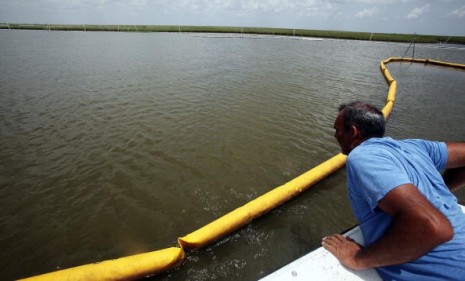Where's the oil?
Clean-up crews are reportedly finding it harder and harder to find the crude that leaked into the waters for three months. Where has it gone?

A free daily email with the biggest news stories of the day – and the best features from TheWeek.com
You are now subscribed
Your newsletter sign-up was successful
While BP has at least temporarily plugged its broken deepwater well in the Gulf of Mexico, more than 200 million gallons of oil are estimated to have spilled since April. But, 100 days into the environmental disaster, clean up crews are reportedly having difficulty finding that escaped crude: (Watch an ABC report about the disappearing oil)
What's the evidence for "missing" oil?
Various anecdotal reports. For instance, three weeks ago skimming crews cleaned up 25,000 barrels of oily water. But two weeks later — after BP installed the temporary cap — they could only find 200 barrels of surface oil. Even the federal government admits it cannot locate as much as 167 million gallons of the spilled crude. "It is becoming a very elusive bunch of oil for us to find," said National Incident Commander Thad Allen.
The Week
Escape your echo chamber. Get the facts behind the news, plus analysis from multiple perspectives.

Sign up for The Week's Free Newsletters
From our morning news briefing to a weekly Good News Newsletter, get the best of The Week delivered directly to your inbox.
From our morning news briefing to a weekly Good News Newsletter, get the best of The Week delivered directly to your inbox.
Is the amount of oil shrinking?
The slick on the surface is. At its peak last month, says ABC News, "the oil slick was the size of Kansas." Now, it's "down to the size of New Hampshire." John Amos, an environmental activist, notes that the surface oil is "really starting to dissipate pretty rapidly."
Has it disappeared for good?
Some of it has. A "significant amount of the oil" has been eaten up by naturally occuring bacteria in the water, says Jane Lubchenko of the National Oceanic and Atmospheric Administration. The Gulf water has an "immense natural capacity" to break down oil, according to the New York Times. Due to the thousands of natural seeps that leak into the Gulf of Mexico throughout the year, its waters are "swarming with bacteria that can eat oil."
A free daily email with the biggest news stories of the day – and the best features from TheWeek.com
But the bacteria surely can't have eaten all the oil?
No. It is suspected that a large quantity of crude may be trapped below the surface. Although it likely has been broken up by the 770,000 gallons of chemical dispersant BP pumped into the oily water in the early days of the spill, plumes of remain beneath the surface. But it's difficult for scientists to assess how much oil there is and what its impact will be on the Gulf's ecosystem.
Are the other helpful factors at play?
The warm water and recent storms in the Gulf have "contributed to a rapid dispersion of the oil," says the Times. The oil itself is "comparatively light and degradeable" compared with the crude spilled in the Valdez disaster, reports Time. And the 4,000-strong flotilla of skimming boats, "the largest in history," appears to have made an impact too.
Does this mean we have over-estimated the environmental impact of the spill?
That remains a hot point of debate. Geologist Ed Owens, a BP contractor described by the AFP as a "world authority on protecting shorelines from oil spills," said the coastal recovery from the spill would take "a matter of months to a year at most." But that is far below the estimates of the Obama administration, and other leading scientists warn of a "decades-long effect on marine life," not to mention a dramatic population crash in the Gulf's bird, mammal and turtle population.
What are the pundits saying?
Although there are still plenty of uncertainties, says Doug Mataconis at Outside the Beltway, "for the moment at least, it looks like we've gotten some good news." Perhaps, says Mac McClelland at Mother Jones. But the media has been far too unskeptical of this BP-friendly narrative. "It's BP's job to whitewash this story and make it easier to indulge the desire to forget about the scope of the devastation, guys. Not the media's."
-
 How the FCC’s ‘equal time’ rule works
How the FCC’s ‘equal time’ rule worksIn the Spotlight The law is at the heart of the Colbert-CBS conflict
-
 What is the endgame in the DHS shutdown?
What is the endgame in the DHS shutdown?Today’s Big Question Democrats want to rein in ICE’s immigration crackdown
-
 ‘Poor time management isn’t just an inconvenience’
‘Poor time management isn’t just an inconvenience’Instant Opinion Opinion, comment and editorials of the day